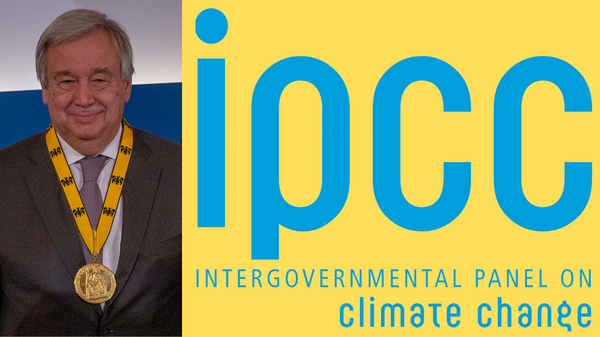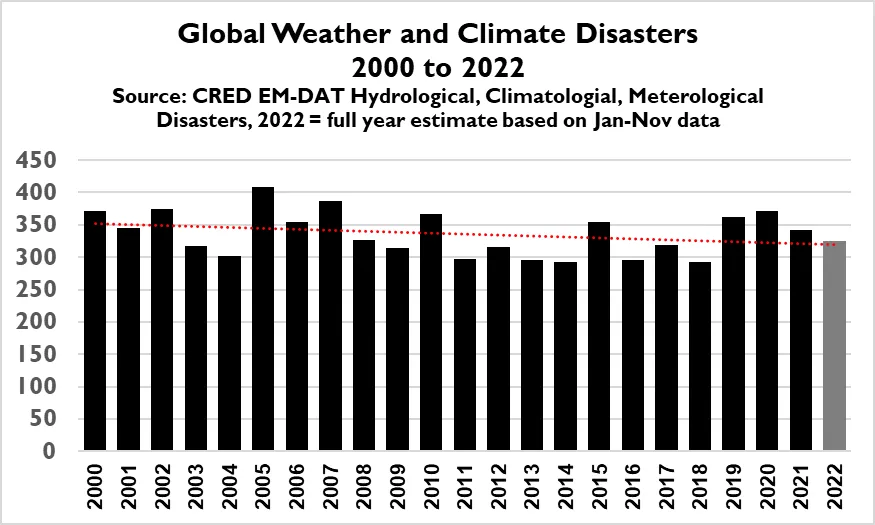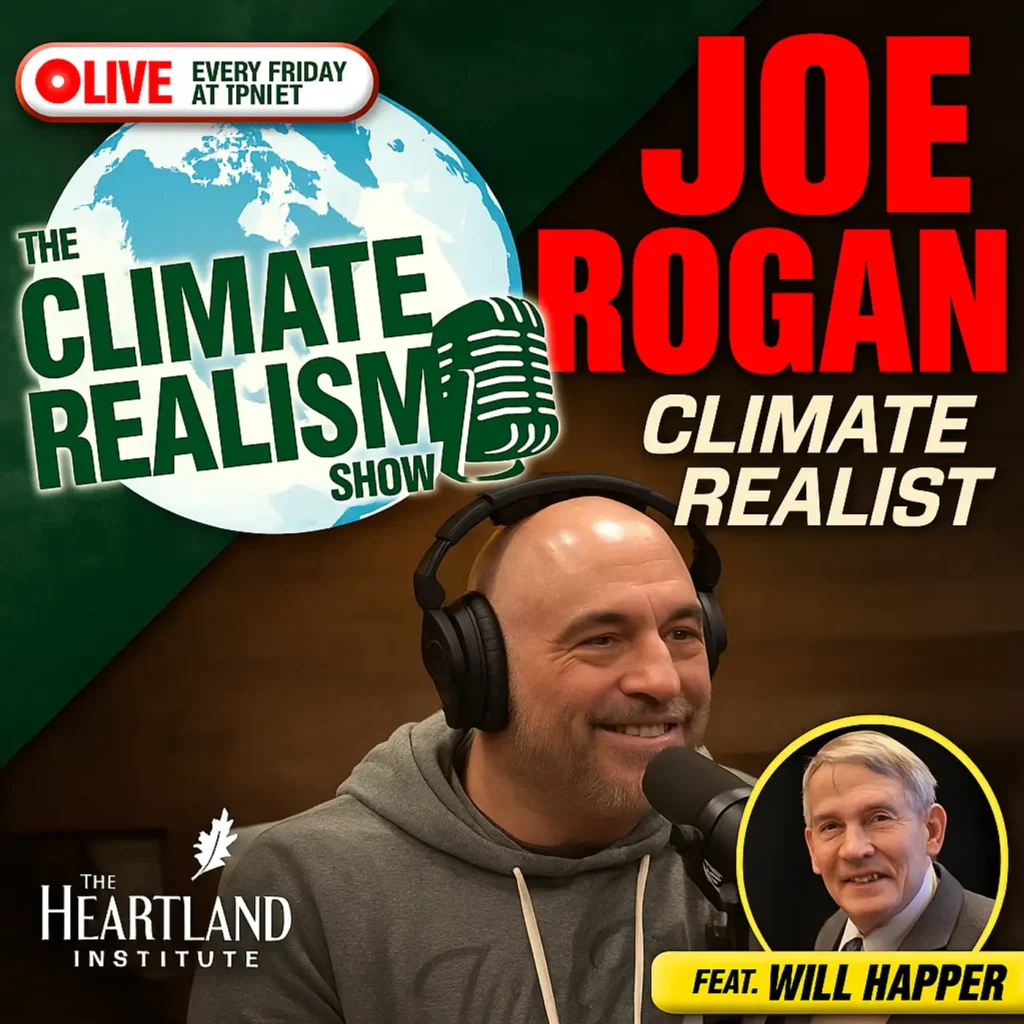YOU SHOULD SUBSCRIBE TO CLIMATE CHANGE WEEKLY.
IN THIS ISSUE:
- New IPCC Report Suggests the Organization May Be Obsolete
- Podcast of the Week: Biden’s New Alaska Drilling Policy Is ‘Economic Self-Mutilation’
- Bank of England Reduces Climate Focus
- Study Questions CO2’s Atmospheric Longevity
- Video of the Week: Implausible Climate Goals For a Non-Existent Emissions Crisis, Steve Milloy
- BONUS Video of the Week: Myths of The Oil Industry, Linnea Lueken
- Climate Comedy
- Recommended Sites
Miss Anything at Heartland’s Climate Conference? No Problem.

New IPCC Report Suggests the Organization May Be Obsolete

Among the topics our Heartland Institute website Climate Realism has regularly addressed since it first came into existence a few years ago has been the publications produced by the United Nations’ Intergovernmental Panel on Climate Change (IPCC). We’ve evaluated the accuracy of its various reports, reported on the admitted weaknesses and flaws inherent in the climate models that inform the IPCC’s projections and policy recommendations, and recounted the regular misstatements the mainstream media and its chosen experts have made about what the IPCC reports say.
The IPCC recently released its final synthesis report in the Sixth Assessment Report series. The paper was focused on ginning up alarm and motivating policy, with no new science.
The mainstream media, with their marching orders in hand, regurgitated the reports’ topline talking points without any analysis or questions. Some of the headlines that led the news on March 20, the day the report was released, were, as we presented in a Climate Realism post, “World is on brink of catastrophic warming, U.N. climate change report says” (The Washington Post), “Now or never: One of the biggest climate reports ever shows time is running out” (NBC News), “Scientists deliver ‘final warning’ on climate crisis: act now or it’s too late” (The Guardian), and inarguably the worst of them: “New IPCC Report Shows the ‘Climate Time Bomb Is Ticking,’ Says UN Secretary General António Guterres” (Inside Climate News).
The main takeaway from the IPCC’s 85-page lament is that we are soon to surpass the dreaded 1.5℃ temperature rise which climate scolds claim will spell doom for the planet. At the 2015 Paris climate conference, 1.5℃ was pegged as the beginning of the end, with 2℃ being the point of no return.
Responding to the media hype surrounding the IPCC’s latest report, my Heartland Institute colleague Anthony Watts notes the IPCC and its boosters have made multiple climate doom predictions tied to lower temperature thresholds, all of which have been surpassed, with the repeatedly predicted doom never coming to pass. A reanalysis of Berkeley Earth global surface temperature data by Willis Eschenbach suggests that not only has the Earth passed the arbitrary 1.5°C threshold set by the IPCC, the planet has actually warmed by 4.0°C since 1750.
Whether the Earth has warmed 1.2, 1.5, or 4.0 degrees Celsius since the beginning of the Industrial Revolution matters less than the effect of the warming. Has it caused more deaths, worsening weather, and food insecurity, etc., as the IPCC’s new synthesis report claims (with high confidence)?
The answer to each of these questions is an emphatic NO!
Since 2016, Climate Realism has posted more than 270 articles refuting claims that various types of extreme weather have become more frequent or intense and showing that weather trends in general have not worsened during the period of modest warming.
In her response to the IPCC’s recent synthesis report, Robinson Center Research Fellow Linnea Lueken notes the report repeatedly makes testable claims that have been refuted by available data and are not even supported by the research cited in the IPCC’s AR6 Physical Science report, on which they are supposedly based.
The IPCC’s synthesis report so utterly botches the science and promotes unjustified alarm that University of Colorado, Boulder researcher Roger Pielke Jr., Ph.D., asks in a post, “Has the IPCC Outlived its Usefulness?”
“[T]he IPCC has strayed far from its role to assess the scientific literature in support of policy making,” writes Pielke. “It has increasingly taken on a stance of explicit political advocacy and as it does so it has ignored and even misrepresented relevant science. The IPCC needs a complete overhaul.”
Pielke cites specific failures in the IPCC Synthesis report:
[H]ere is the top-line conclusion of the past nine years of work under the umbrella of the Intergovernmental Panel on Climate Change:
“Urgent climate action can secure a liveable future for all”
That’s it. Generic and empty political exhortation that is all-so-common in climate advocacy. No science at all.
What is a “liveable future” we might ask?
Who knows? It is not a scientific term, and it is not even defined by the IPCC. The phrase appears in the IPCC AR6 Working Group 2 report and can also be found in the IPCC Special Report on 1.5 degrees Celsius. It comes from a part of the academic literature that emphasizes “climate-resilient development.”
The new report downplays research showing that extreme scenarios are increasingly implausible and once again centers research that emphasizes RCP8.5 and SSP5-8.5. …
Perhaps the most glaring omission by the report is on the science of “loss and damage” which is emphasized throughout the report. The Synthesis Report is not the only part of the IPCC that has ignored data and evidence on the economic and human cost of disasters, as I have frequently documented here.
The IPCC makes a big deal about “loss and damage” as a central reason why action is needed:
Economic impacts attributable to climate change are increasingly affecting peoples’ livelihoods and are causing economic and societal impacts across national boundaries.
What does the data on “loss and damage” say? …

Global disasters related to weather and climate have not increased. Their impacts on people affected, lives lost and damage as a proportion of GDP have all decreased (not shown here, but see this post for the data).
[T]he overall number of weather and climate disasters have decreased so far this century, economic losses [are] down as a proportion of economic activity and deaths and people affected by extremes are sharply down in recent decades.
Although you wouldn’t know it from reading the synthesis report, deaths attributable to extreme weather and nonoptimal temperatures have fallen even more dramatically than property damages and monetary losses.
I go farther than Pielke in my critique of the IPCC. It has not suddenly become obsolete; it is and has been misguided and dangerous since its inception. The idea that some governments can by fiat decide at a single point in time to create an organization that “speaks for the science” of any particular discipline is misguided, unscientific, and dangerous.
Had the Earth’s modest, entirely conceptual, and in a real sense made-up “average temperature” rise never become a point of obsession for the IPCC; had the minor trace gas, carbon dioxide, the naturally occurring gas that is critical to all life on Earth, never been labeled a pollutant by the IPCC; had fossil fuel use never become the central villain in the IPCC’s climate crisis fairy tale, the world would be much better off today.
There would not be millions of young people around the world suffering from psychological disorders in response to the regular drumbeat of alarming coverage that has led them to believe they have no future because the world is coming to an end due to the rapacious actions of their evil forebears. We would not have squandered billions, if not trillions, of dollars in a vain attempt to control the weather by restricting fossil fuels and replacing them with environmentally damaging “green” energy alternatives. These wasted resources could have been devoted instead to raising the world’s poorest people out of poverty, building better infrastructure, providing reliable energy, increasing food supplies, and preventing and treating diseases. Certainly this would have done far more good for the Earth’s poor than the handwringing, haranguing, and development impediments thrown up in the fight to save the world from climate change.
Had the IPCC never been brought into existence, people would have more choices in the marketplace and in their personal lives, and in fact millions if not billions of tons of carbon dioxide would not have been released into the atmosphere by attendees of more than 30 years of grandiose meetings of conference of the parties, where global elites, their sycophants, and boosters fly in on private jets, take limousines and armored SUVs to four-star hotels, and eat elaborate meals in climate-controlled comfort, all to accomplish nothing that has had any effect at all on CO2 emissions, concentrations, or global weather patterns.
What a waste of breath, time, and resources—except for those who have profited handsomely from it all. Climate change hysteria has fueled the greatest transfer of wealth from the poor in rich countries to the wealthy, corrupt, and powerful in rich and poor countries alike, in the history of mankind. The IPCC has nothing to recommend it, and in my opinion, it never has.
Sources: The Honest Broker; Climate Realism



